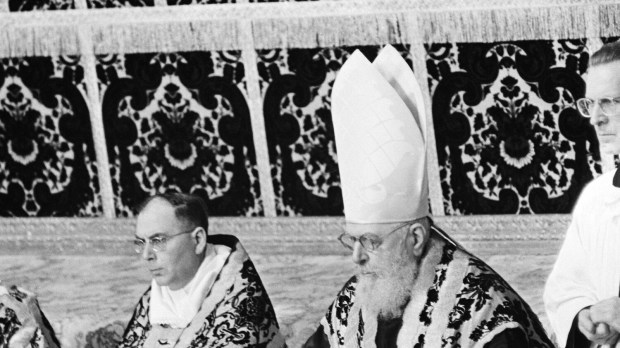Wednesday 4 May 2022
1. Fact and fiction: Vatican II and the ‘vocations crisis’
2. Central Asian bishops’ conference elects first president
3. Egypt restores its oldest synagogue, on the site where the Pharaoh’s daughter found Moses
4. The Italian Church wants fewer and fewer godparents
5. What the Russian media thinks of the Pope’s interview with Italian daily Corriere della Sera
~
Fact and fiction: Vatican II and the ‘vocations crisis’
For decades, it has been common to speak of a “vocation crisis” in the Church. More and more parishes are merging, and the number of seminarians is always decreasing. In some Catholic circles, many have taken to blaming the Second Vatican Council for this decline. The Pillar has attempted to analyze the numbers that bear witness to this, and seems to draw the conclusion that the “crisis” began before the Council’s opening years. Gathering data on the number of diocesan priestly ordinations per year in 17 major dioceses of the world, it finds that from 1950 to 1961, the number of diocesan ordinations had already dropped by 28% (Vatican II began in 1962). The reason for this decline is perhaps due to the fact that Europe and the world in general were emerging from two destructive world wars and nuclear threats. But even the dioceses of the developing world (Manila, São Paulo, Mexico City, Buenos Aires, etc.), analyzed by The Pillar over this same period, show a significant drop in vocations. Will this significant decline push the leadership of the Catholic Church worldwide to consider the controversial options proposed by the German synod? wonders the media outlet, mentioning the priesthood for women as an example.
The Pillar, English
Central Asian bishops’ conference elects first president
The newly created Catholic Bishops’ Conference of Central Asia has elected its first president: the Bishop of the Diocese of the Holy Trinity in Almaty, Kazakhstan, Spanish national José Luis Mumbiela Sierra. The Vatican Congregation for the Evangelization of Peoples created the new conference in September 2021 to help bishops throughout Central Asia respond to common challenges and to ensure mutual support. Bishops and church representatives from Kazakhstan, Kyrgyzstan, Tajikistan, Turkmenistan, Uzbekistan, Mongolia and Afghanistan, along with Church leaders from the Vatican and South Korea, met at the end of April to elect the president. They also set pastoral priorities and discussed Pope Francis’ planned visit to Kazakhstan next September. Bishop Sierra is the first Bishop of Almaty, a diocese created in 2013.
Catholic News Service, English
Egypt restores its oldest synagogue, on the site where the Pharaoh’s daughter found Moses
Egypt has begun renovating the Ben Ezra Synagogue in Cairo, the oldest in the country, to protect it from rainwater intrusion. The roots of the building go back to the 6th century BC, when it was built on the site where, according to tradition, the Pharaoh’s daughter found Moses as a child in a basket among the reeds. The prophet of the 10 Commandments supposedly grew up there, and from there also prayed for the end of the plague which struck the Egyptians. During the Roman invasion of Egypt in 30 BC, the synagogue was destroyed. Then in the 7th century AD, the Copts built a church on the site, until a Jew bought the place in the 9th century to rebuild a synagogue. The latter was restored many times over the centuries. Today, the synagogue is a veritable museum, which can be visited and holds a 900-year-old mikveh in its center dedicated to purity rites. It also houses some 200,000 religious manuscripts and medieval historical documents written in Hebrew, Aramaic, and Judeo-Arabic, dating from the sixth to the nineteenth century, known as the “Genizah of Cairo.”
Terre Sainte, French
The Italian Church wants fewer and fewer godparents
In Italy, more and more dioceses, especially in Sicily and Calabria, are eliminating the presence of godparents during baptisms and confirmations. For Il Post, this series of decisions to distance the Church from godparents, especially in order to dissociate the Christian faith from the “alliances of power” forged by organized crime, are not the only ones involved in the “crisis” concerning the figure of godparents. The media outlet notes that in the whole Christian world, even in the Protestant denominations, the diminishing centrality of the godfather and the godmother has been discussed for years. The one who should be, according to the Code of Canon Law, a spiritual companion of the person who receives baptism or confirmation, is often chosen “for reasons of affection, kinship, social convenience, which have little to do with the Christian formation, which is instead provided by others,” writes Bishop of Grosseto, Giovanni Roncari. However for some, the total erasure of the figure of the godfather and godmother does not solve the problems of which they are a symptom.
Il Post, Italian
What the Russian media thinks of the Pope’s interview with Italian daily Corriere della Sera
The Corriere della Sera’s Moscow correspondent presents the reactions in the Russian press to the Pope’s interview with the Italian daily. The state press agencies Ria Novosti, Interfax and Tass have transcribed the text in an almost complete version, but the head of the Catholic Church continues to inspire great distrust in the most influential media. “If the Pope should come to Moscow, let him not expect a red carpet at his feet,” said the news anchor of Rossiya-1, Russia’s first TV channel, coldly. “The relationship between us and ‘them’ is now too compromised,” he said. The most nationalistic media and those closest to the Kremlin, such as Moskovsky Komsomolets and Russia Today, highlighted the Pope’s statements on “NATO’s barking at Russia’s doorstep.” The website Zargrad, close to the Russian Orthodox Church, warns the Pope, who is being equated with the West, “let him know that we will never accept this indecent peace that the whole Western world is asking of Russia.”
Corriere della Sera, Italian

